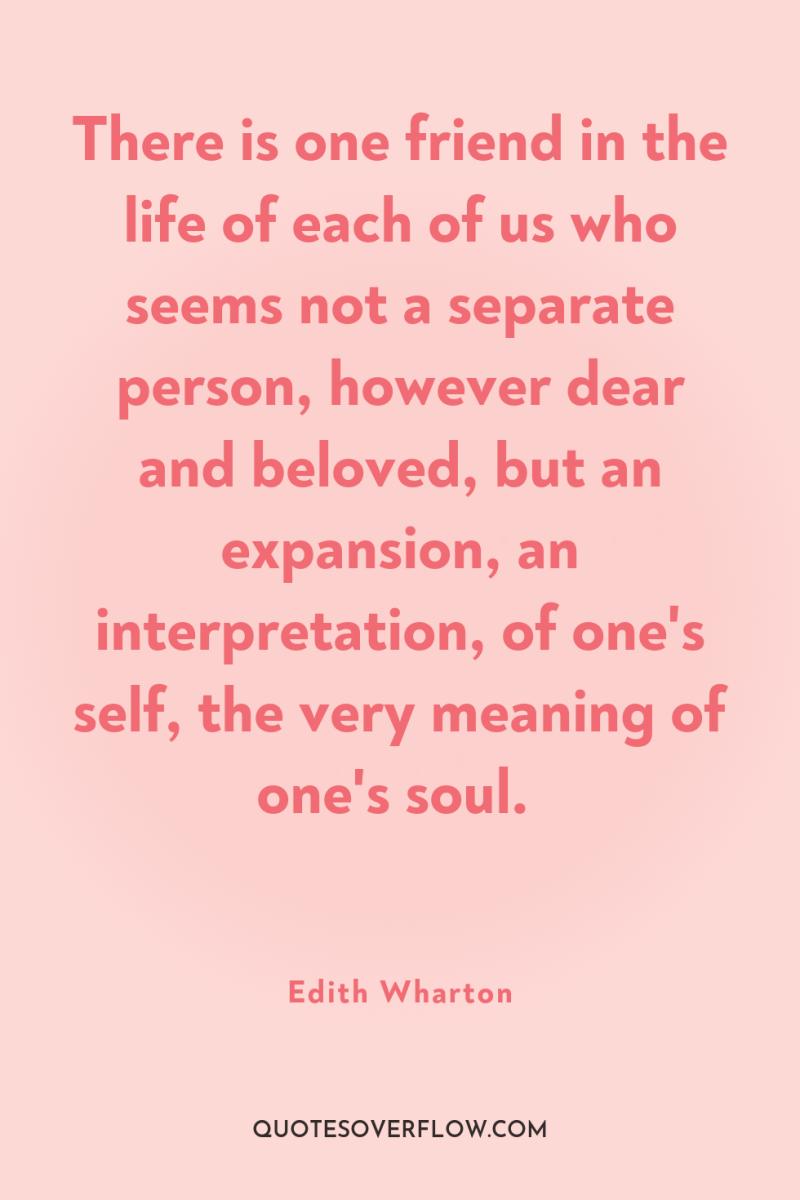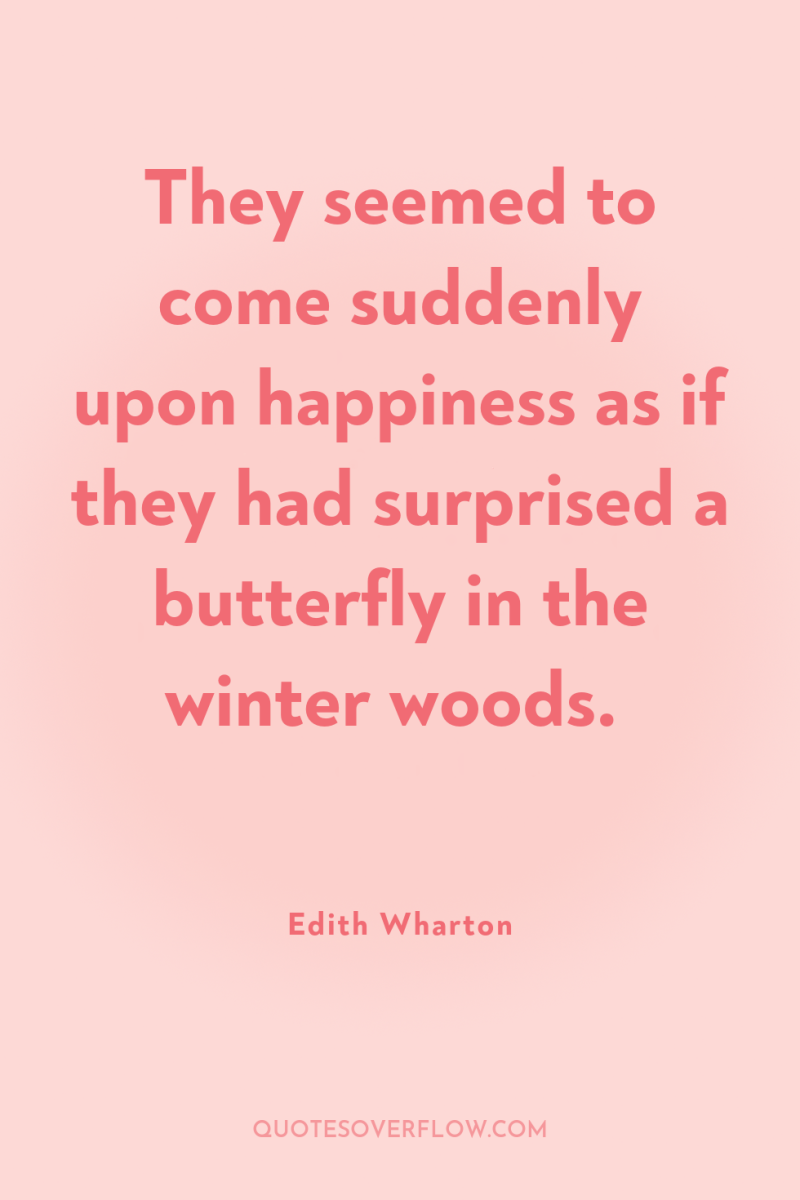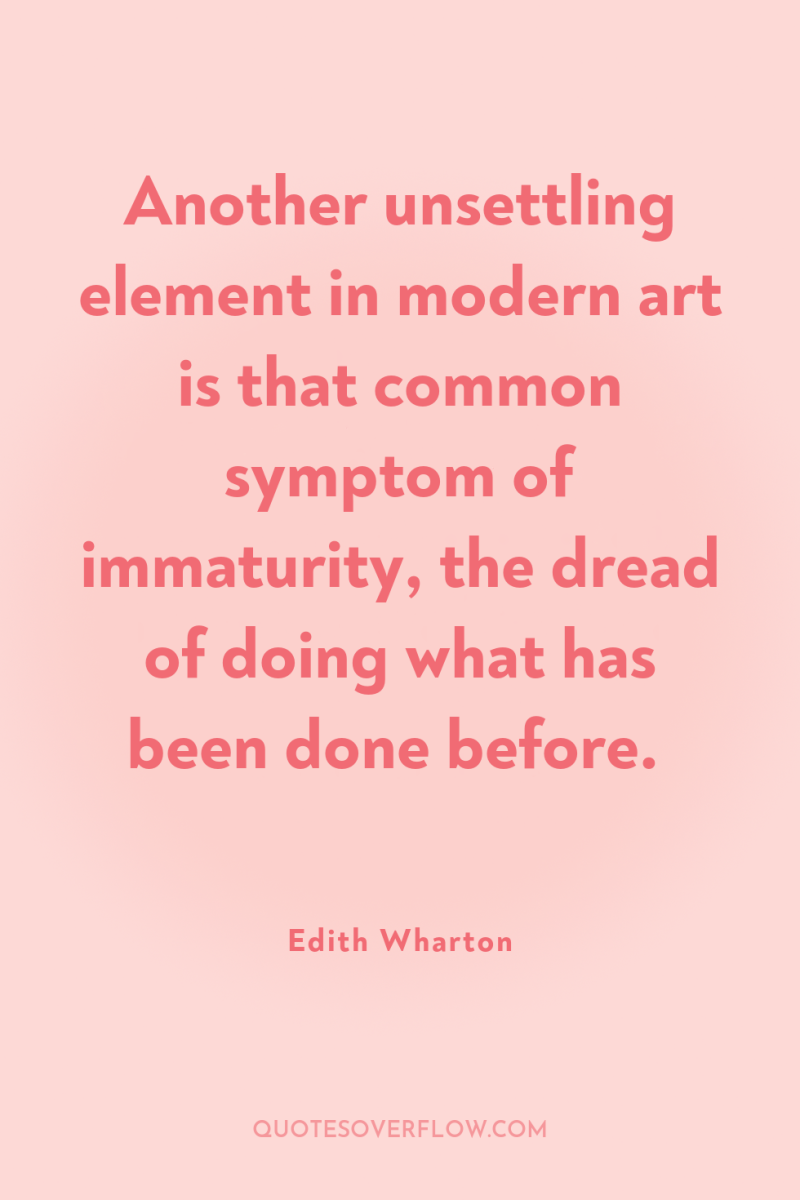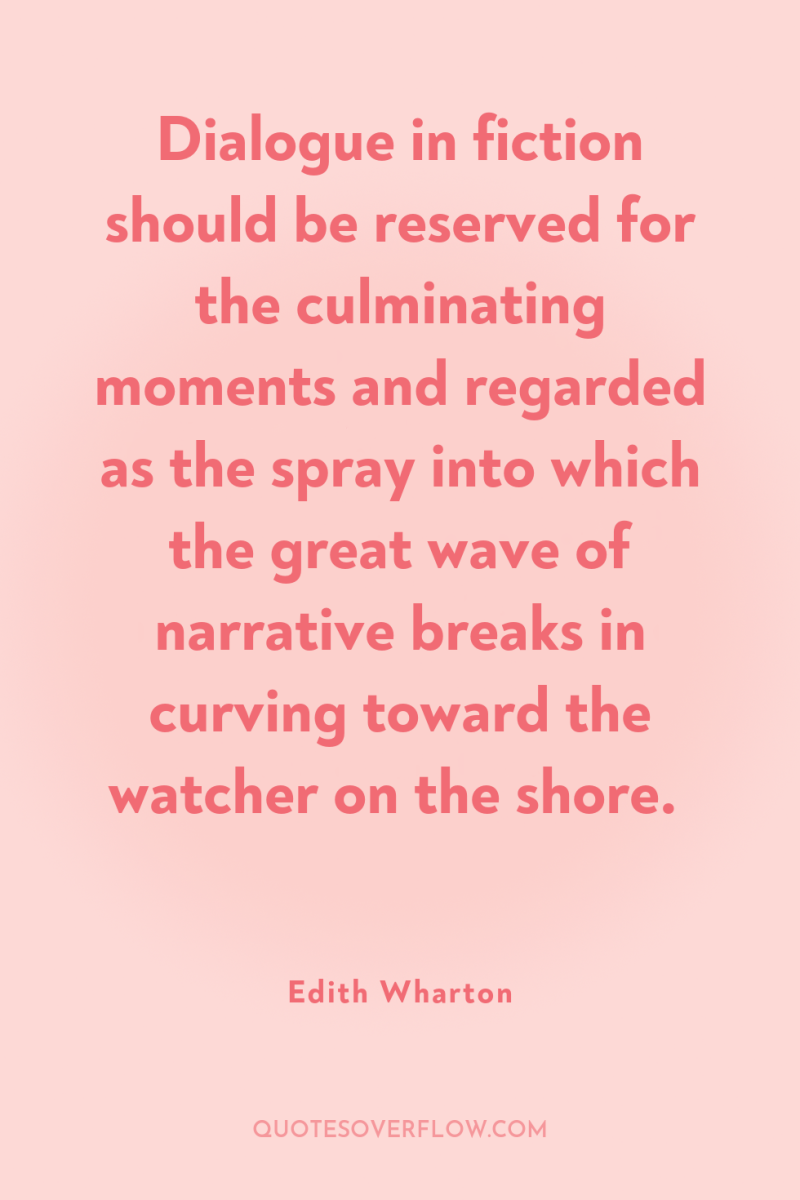
1
Each time you happen to me all over again.Edith Wharton

2
There is one friend in the life of each of us who seems not a separate person, however dear and beloved, but an expansion, an interpretation, of one's self, the very meaning of one's soul.Edith Wharton

3
Do you remember what you said to me once? That you could help me only by loving me? Well-you did love me for a moment and it helped me. It has always helped me.Edith Wharton

4
Genius is of small use to a woman who does not know how to do her hair.Edith Wharton
5
To know when to be generous and when firm–that is wisdom.Edith Wharton

6
If only we'd stop trying to be happy, we could have a pretty good time.Edith Wharton
7
There are lots of ways of being miserable, but there’s only one way of being comfortable, and that is to stop running round after happiness. If you make up your mind not to be happy there’s no reason why you shouldn’t have a fairly good time.Edith Wharton

8
They seemed to come suddenly upon happiness as if they had surprised a butterfly in the winter woods.Edith Wharton
9
Yes - it was happiness she still wanted, and the glimpse she had caught of it made everything else of no account. One by one she had detached herself from the baser possibilities , and she saw that nothing now remained to her but the emptiness of renunciation. "The House of MirthEdith Wharton

10
True originality consists not in a new manner, but in a new vision.Edith Wharton

11
Another unsettling element in modern art is that common symptom of immaturity, the dread of doing what has been done before.Edith Wharton

12
Dialogue in fiction should be reserved for the culminating moments and regarded as the spray into which the great wave of narrative breaks in curving toward the watcher on the shore.Edith Wharton
13
High PastureCome up--come up: in the dim vale below The autumn mist muffles the fading trees, But on this keen hill-pasture, though the breeze Has stretched the thwart boughs bare to meet the snow, Night is not, autumn is not--but the flow Of vast, ethereal and irradiate seas, Poured from the far world's flaming boundaries In waxing tides of unimagined glow. And to that height illumined of the mindhe calls us still by the familiar way, Leaving the sodden tracks of life behind, Befogged in failure, chilled with love's decay-- Showing us, as the night-mists upward wind, How on the heights is day and still more day.Edith Wharton

14
Her failure was a useful preliminary to success.Edith Wharton
15
One of the surprises of her unoccupied state was the discovery that time, when it is left to itself and no definite demands are made on it, cannot be trusted to move at any recognized pace. Usually it loiters; but just when one has come to count upon its slowness, it may suddenly break into a wild irrational gallop.Edith Wharton

16
Don't you ever mind, " she asked suddenly, "not being rich enough to buy all the books you want?Edith Wharton
17
Some men, " Flamel irresistibly added, "think of books merely as tools, others as tooling. I'm between the two; there are days when I use them as scenery, other days when I want them as society; so that, as you see, my library represents a makeshift compromise between looks and brains, and the collectors look down on me almost as much as the students.Edith Wharton
18
You mustn't tell your dreams. Miss Testvalley says nothing bores people so much as being told other people's dreams. Nan said nothing, but an iron gate seemed to clang shut in her - the gate that was so often slammed by careless hands. As if anyone could be bored by such dreams as hers!Edith Wharton
19
I don't want them to think that we dress like savages, ' she replied, with a scorn that Pocahontas might have resented; and he was struck again by the religious reverence of even the most unworldly American women for the social advantages of dress.' It's their armour, ' he thought, 'their defence against the unknown, and their defiance of it.' And he understood for the first time the earnestness with which May, who was incapable of tying a ribbon in her hair to charm him, had gone through the solemn rite of selecting and ordering her extensive wardrobe.Edith Wharton
20
The whole truth?" Miss Bart laughed. "What is the truth? Where a woman is concerned, it's the story that's easiest to believe. In this case it's a great deal easier to believe Bertha Dorset's story than mine, because she has a big house and an opera box, and it's convenient to be on good terms with herEdith Wharton
21
The true felicity of a lover of books is the luxurious turning of page by page, the surrender, not meanly abject, but deliberate and cautious, with your wits about you, as you deliver yourself into the keeping of the book. This I call reading.Edith Wharton
22
What novels did you read when you were young, dear? I'm convinced it all turns on that.Edith Wharton
23
If the ability to read carries the average man no higher than the gossip of his neighbours, if he asks nothing more nourishing out of books and the theatre than he gets hanging about the store, the bar and the street-corner, then culture is bound to be dragged down to him instead of his being lifted up by culture.Edith Wharton
24
The visible world is a daily miracle, for those who have eyes and ears.Edith Wharton
25
With a shiver of foreboding he saw his marriage becoming what most of the other marriages about him were: a dull association of material and social interests held together by ignorance on the one side and hypocrisy on the other.Edith Wharton
26
..but it seemed to him that the tie between husband and wife, if breakable in prosperity, should be indissoluble in misfortune.Edith Wharton
27
Their long years together had shown him that it did not so much matter if marriage was a dull duty, as long as it kept the dignity of duty: lapsing from that, it became a mere battle of ugly appetites.Edith Wharton
28
As he paid the hansom and followed his wife's long train into the house he took refuge in the comforting platitude that the first six months were always the most difficult in marriage. 'After that I suppose we shall have pretty nearly finished rubbing off each other’s angles, ' he reflected; but the worst of it was that May's pressure was already bearing on the very angles whose sharpness he most wanted to keep .Edith Wharton
29
If you're as detached as that, why does the obsolete institution of marriage survive with you?" Oh, it still has its uses. One couldn't be divorced without it.Edith Wharton
30
He could not imagine being bored by Susy -- or trying to escape from her if he were. He could not think of her as an enemy, or even as an accomplice, since accomplices are potential enemies: she was some one with whom, by some unheard-of miracle, joys above the joys of friendship were to be tasted, but who, even through these fleeting ecstasies, remained simply and securely his friend.Edith Wharton
31
A sense of having been decoyed by some world-old conspiracy into this bondage of body and soul filled her with despair. If marriage was the slow life-long acquittal of a debt contracted in ignorance, then marriage was a crime against human nature.Edith Wharton
32
An unalterable and unquestioned law of the musical world required that the German text of French operas sung by Swedish artists should be translated into Italian for the clearer understanding of English-speaking audiences.Edith Wharton
33
...the people who find fault with society are too apt to regard it as an end and not a means, just as the people who despise money speak as if its only use were to be kept in bags and gloated over? Isn't it fairer to look at them both as opportunities, which may be used either stupidly or intelligently, according to the capacity of the user?Edith Wharton
34
The real loneliness is living among all these kind people who only ask one to pretend!Edith Wharton
35
The motions of her mind were as incalculable as the flit of a bird in the branchesEdith Wharton
36
Little as she was addicted to solitude, there had come to be moments when it seemed a welcome escape from the empty noises of her life.Edith Wharton
37
The return to reality was as painful as the return to consciousness after taking an anestheticEdith Wharton
38
A frivolous society can acquire dramatic significance only through what its frivolity destroys.Edith Wharton
39
There were certain things that had to be done, and if done at all, done handsomely and thoroughly; and one of these, in the old New York code, was the tribal rally around a kinswoman about to be eliminated from the tribe.Edith Wharton
40
It was before him again in its completeness -- the choice in which she was content to rest: in the stupid costliness of the food and the showy dulness of the talk, in the freedom of speech which never arrived at wit and the freedom to act which never made for romance. The strident setting of the restaurant, in which their table seemed set apart in a special glare of publicity, and the presence at it of little Dabham of the "Riviera Notes, " emphasized the ideals of a world where conspicuousness passed for distinction, and the society column had become the roll of fame.Edith Wharton
41
The taste of the usual was like cinders in his mouth, and there were moments when he felt as if he were being buried alive under his future.Edith Wharton
42
A classic is classic not because it conforms to certain structural rules, or fits certain definitions (of which its author had quite probably never heard). It is classic because of a certain eternal and irrepressible freshness.Edith Wharton
43
As he lay there, fragments of past states of emotion, fugitive felicities of thought and sensation, rose and floated on the surface of his thoughts. It was one of those moments when the accumulated impressions of life converge on heart and brain, elucidating, enlacing each other, in a mysterious confusion of beauty. He had had glimpses of such a state before, of such mergings of the personal with the general life that one felt one's self a mere wave on the wild stream of being, yet thrilled with a sharper sense of individuality than can be known within the mere bounds of the actual. But now he knew the sensation in its fulness, and with it came the releasing power of language. Words were flashing like brilliant birds through the boughs overhead; he had but to wave his magic wand to have them flutter down to him. Only they were so beautiful up there, weaving their fantastic flights against the blue, that it was pleasanter, for the moment, to watch them and let the wand lie.Edith Wharton
44
I have tried hard - but life is difficult, and I am a very useless person. I can hardly be said to have an independent existence. I was just a screw or a cog in the great machine called life, and when I dropped out of it I found I was no use anywhere else. What can one do when one finds out that one only fits into one hole? One must go back to it or be thrown out into the rubbish heap - and you don't know what it's like in the rubbish heap!.Edith Wharton
45
Conservatives cherished it for being small and inconvenient, and thus keeping out the "new people" whom New York was beginning to dread and yet be drawn toEdith Wharton
46
They had never been at peace together, they two; and now he felt himself drawn downward into the strange mysterious depths of her tranquillity.Edith Wharton
47
In the rosy glow it diffused her companions seemed full of amiable qualities. She liked their elegance; their lightness, their lack of emphasis: even the self-assurance which at times was so like obtuseness now seemed the natural sign of social ascendency. They were lords of the only world she cared for, and they were ready to admit her to their ranks and let her lord it with them. Already she felt within her a stealing allegiance to their standards, an acceptance of their limitations, a disbelief in the things they did not believe in, a contemptuous pity for the people who were not able to live as they lived. .Edith Wharton
48
As the pain that can be told is but half a pain, so the pity that questions has little healing in its touch. What Lily craved was the darkness made by enfolding arms, the silence which is not solitude, but compassion holding its breath.Edith Wharton
49
I hate in-the-end kindnesses: they're about as nourishing as the third day of cold mutton.Edith Wharton
50
One of the great things about travel is you find out how many good, kind people there are.Edith Wharton
51
They had paused before the table on which the bride’s jewel were displayed, and Lily’s heart gave an envious throb as she caught the refraction of light from their surfaces — the milky gleam of perfectly matched pearls, the flash of rubies relieved against contrasting velvet, the intense blue rays of sapphires kindled into light by surrounding diamonds: all these precious tints enhanced and deepened by the varied art of their setting. The glow of the stones warmed Lily’s veins like wine. More completely than any other expression of wealth they symbolized the life she longed to lead, the life of fastidious aloofness and refinement in which every detail should have the finish of a jewel, and the whole form a harmonious setting to her own jewel-like rareness.Edith Wharton
52
This new resolve gave her a sort of light-headed self-confidence: when she left the dinner-table she felt so easy and careless that she was surprised to see that the glass of champagne beside her plate was untouched. She felt as if all its sparkles were whirling through her.Edith Wharton
53
The noble buoyancy of her attitude, its suggestion of soaring grace, revealed the touch of poetry in her beauty that Selden always felt in her presence, yet lost the sense of when he was not with her. Its expression was now so vivid that for the first time he seemed to see before him the real Lily Bart, divested of all the trivialities of her little world, and catching for a moment a note of that eternal harmony of whichher beauty was a part.Edith Wharton
54
Archer had always been inclined to think that chance and circumstance played a small part in shaping people's lots compared with their innate tendency to have things happen to them.Edith Wharton
55
The fact that he and she understood each other without a word seemed to bring them nearer than any explanation would have done.Edith Wharton
56
Don't you know how, in talking a foreign language, even fluently, one says half the time not what one wants to but what one can?Edith Wharton
57
Don't they always go from bad to worse? There's no turning back--yourold self rejects you, and shuts you out. ~Lilly BartEdith Wharton
58
She rose too, not as if to meet him or to flee from him, but quietly, as though the worst of the task were done and she had only to wait; so quietly that, as he came close, her outstretched hands acted not as a check but as a guide to him.Edith Wharton
59
It's more real to me here than if I went up, " he suddenly heard himself say; and the fear lest that last shadow of reality should lose its edge kept him rooted to his seat as the minutes succeeded each other.Edith Wharton
60
The greatest mistake is to think that we ever know why we do things... I suppose the nearest we can ever come to it is by getting what old people call 'experience.' But by the time we've got that we're no longer the persons who did the things we no longer understand. The trouble is, I suppose, that we change every moment; and the things we did stay.Edith Wharton
61
Medora Manson, in her prosperous days, inaugurated a "literary salon"; but it had soon died out owing to the reluctance of the literary to frequent it.Edith Wharton
62
It was horrible of a young girl to let herself be talked about; however unfounded the charges against her, she must be to blame for their having been made.Edith Wharton
63
Ah, don't let us undo what you've done! ' she cried. 'I can't go back now to that other way of thinking. I can't love you unless I give you up.Edith Wharton
64
I want to put my hand out and touch you. I want to do for you and care for you. I want to be there when you're sick and when you're lonesome.Edith Wharton
65
Ah, no, he did not want May to have that kind of innocence, the innocence that seals the mind against imagination and the heart against experience...Edith Wharton
66
...though she had not had the strength to shake off the spell that bound her to him she had lost all spontaneity of feeling, and seemed to herself to be passively awaiting a fate she could not avert.Edith Wharton
67
The immense accretion of flesh which had descended on her in middle life like a flood of lava on a doomed city had changed her from a plump active little woman with a neatly-turned foot and ankle into something as vast and august as a natural phenomenon. She had accepted this submergence as philosophically as all her other trials, and now, in extreme old age, was rewarded by presenting to her mirror an almost unwrinkled expanse of firm pink and white flesh, in the centre of which the traces of a small face survived as if awaiting excavation. A flight of smooth double chins led down to the dizzy depths of a still-snowy bosom veiled in snowy muslins that were held in place by a miniature portrait of the late Mr. Mingott; and around and below, wave after wave of black silk surged away over the edges of a capacious armchair, with two tiny white hands poised like gulls on the surface of the billows. .Edith Wharton
68
What she craved and really felt herself entitled to was a situation in which the noblest attitude should also be the easiest.Edith Wharton
69
The "Hazeldean heart" was a proverbial boast in the family; the Hazeldeans privately considered it more distinguished than the Sillerton gout, and far more refined than the Wesson liver; and it had permitted most of them to survive, in valetudinarian ease, to a ripe old age, when they died of some quite other disorder. But Charles Hazeldean had defied it, and it took its revenge, and took it savagely.Edith Wharton
70
There are two ways of spreading light: to be The candle or the mirror that reflects it.Edith Wharton
71
She seemed always to have seen him through a blur - first of sleepiness, then of distance and indifference - and now the fog had thickened till he was almost indistinguishable.Edith Wharton
72
Believe me, all of you, the best way to help the places we live in is to be glad we live there.Edith Wharton
73
...how much did pride count in the ebullition of passions in his breast?Edith Wharton
74
I went on steadily trying to 'find out how to'; but I wrote two or three novels without feeling that I had made much progress. It was not until I wrote "Ethan Frome" that I suddenly felt the artisan's full control of his implements. When "Ethan Frome" first appeared I was severely criticized by the reviewers for what was considered the clumsy structure of the tale. I had pondered long on this structure, had felt its peculiar difficulties, and possible awkwardness, but could think of no alternative which would serve as well in the given case: and though I am far from thinking "Ethan Frome" my best novel, and am bored and even exasperated when I am told that it is, I am still sure that its structure is not its weak point. .Edith Wharton
75
You see, Monsieur, it's worth everything, isn't it, to keep one's intellectual liberty, not to enslave one'spowers of appreciation, one's critical independence? It was because of that that I abandoned journalism, andtook to so much duller work: tutoring and private secretaryship. There is a good deal of drudgery, of course;but one preserves one's moral freedom, what we call in French one's quant a soi. And when one hears goodtalk one can join in it without compromising any opinions but one's own; or one can listen, and answer itinwardly. Ah, good conversation--there's nothing like it, is there? The air of ideas is the only air worthbreathing. And so I have never regretted giving up either diplomacy or journalism--two different forms of thesame self-abdication." He fixed his vivid eyes on Archer as he lit another cigarette. "Voyez-vous, Monsieur, to be able to look life in the face: that's worth living in a garret for, isn't it? But, after all, one must earnenough to pay for the garret; and I confess that to grow old as a private tutor--or a `private' anything--is almostas chilling to the imagination as a second secretaryship at Bucharest. Sometimes I feel I must make a plunge:an immense plunge. Do you suppose, for instance, there would be any opening for me in America-- in NewYork? .Edith Wharton
76
It seems stupid to have discovered America only to make it into a copy of another country.Edith Wharton
77
Selden and Lily stood still, accepting the unreality of the scene as a part of their own dream-like sensations. It would not have surprised them to feel a summer breeze on their faces, or to see the lights among the boughs reduplicated in the arch of a starry sky. The strange solitude about them was no stranger than the sweetness of being alone in it together.Edith Wharton
78
Is there nowhere in an American house where one may be by one's self?Edith Wharton
79
So close to the powers of evil she must have lived that she still breathed more freely in their air.Edith Wharton
80
She said she knew we were safe with you, and always would be, because once, when she asked you to, you'd given up the thing you most wanted." Archer received this strange communication in silence. His eyes remained unseeingly fixed on the thronged sunlit square below the window. At length he said in a low voice: "She never asked me.Edith Wharton
81
Sometimes life seems like a match between oneself and one's gaolors. The gaolers, of course, are one's mistakes; and the question is, who'll hold out longest? When I think of that, life instead of being too long, seems as short as a winter day....Edith Wharton
82
Something he knew he had missed: the flower of life. But he thought of it now as a thing so unattainable and improbable that to have repined would have been like despairing because one had not drawn the first prize in a lottery.Edith Wharton
83
His own exclamation: “Women should be free–as free as we are, ” struck to the root of a problem that it was agreed in his world to regard as nonexistent. “Nice” women, however wronged, would never claim the kind of freedom he meant, and generous-minded men like himself were therefore–in the heat of argument–the more chivalrously ready to concede it to them. Such verbal generosities were in fact only a humbugging disguise of the inexorable conventions that tied things together and bound people down to the old pattern.Edith Wharton
84
...life makes ugly faces at us sometimes, I know.Edith Wharton
85
Do you know, I began to see what marriage is for. It’s to keep people away from each other. Sometimes I think that two people who love each other can be saved from madness only by the things that come between them–children, duties, visits, bores, relations–the things that protect married people from each other. We’ve been too close together–that has been our sin. We’ve seen the nakedness of each other’s souls.Edith Wharton
86
Oh, Gerty, I wasn't meant to be good.Edith Wharton
87
It frightened him to think what must have gone to the making of her eyes.Edith Wharton
88
She had no tolerance for scenes which were not of her own making.Edith Wharton
89
Perhaps I might have resisted a great temptation, but the little ones would have pulled me downEdith Wharton
90
She had in truth no abstract propensity to malice: she did not dislike Lily because the latter was brilliant and predominant, but because she thought that Lily disliked her. It is less mortifying to believe one's self unpopular than insignificant, and vanity prefers to assume that indifference is a latent form of unfriendliness.Edith Wharton
91
We are expected to be pretty and well-dressed until we drop.Edith Wharton
92
Since then he had been walking with a ghost: the miserable ghost of his illusion. Only he had somehow vivified, coloured, substantiated it, by the force of his own great need — as a man might breathe a semblance of life into a dear drowned body that he cannot give up for dead.Edith Wharton
93
The blast that swept him came off New Hampshire snow-fields and ice-hung forests. It seemed to have traversed interminable leagues of frozen silence, filling them with the same cold roar and sharpening its edge against the same bitter black-and-white landscape.(" The Triumph Of The Night")Edith Wharton
94
But at sunset the clouds gathered again, bringing an earlier night, and the snow began to fall straight and steadily from a sky without wind, in a soft universal diffusion more confusing than the gusts and eddies of the morning. It seemed to be a part of the thickening darkness, to be the winter night itself descending on us layer by layer.Edith Wharton
95
Does no one want to know the truth here, Mr. Archer? The real loneliness is living among all these kind of people who only ask one to pretend!Edith Wharton
96
Set wide the window. Let me drink the day.Edith Wharton
97
Overhead hung a summer sky furrowed with the rush of rockets; and from the east a late moon, pushing up beyond the lofty bend of the coast, sent across the bay a shaft of brightness which paled to ashes in the red glitter of the illuminated boats.Edith Wharton
98
Her mind was an hotel where facts came and went like transient lodgers, without leaving their address behind, and frequently without paying for their board.Edith Wharton
99
She herself had grown up without any one spot of earth being dearer than another: there was no center of earth pieties, of grave endearing traditions, to which her heart could revert and from which it could draw strength for itself and tenderness for others.Edith Wharton
100
There are two ways of spreading light: to be the candle or the mirror that reflects it.Edith Wharton